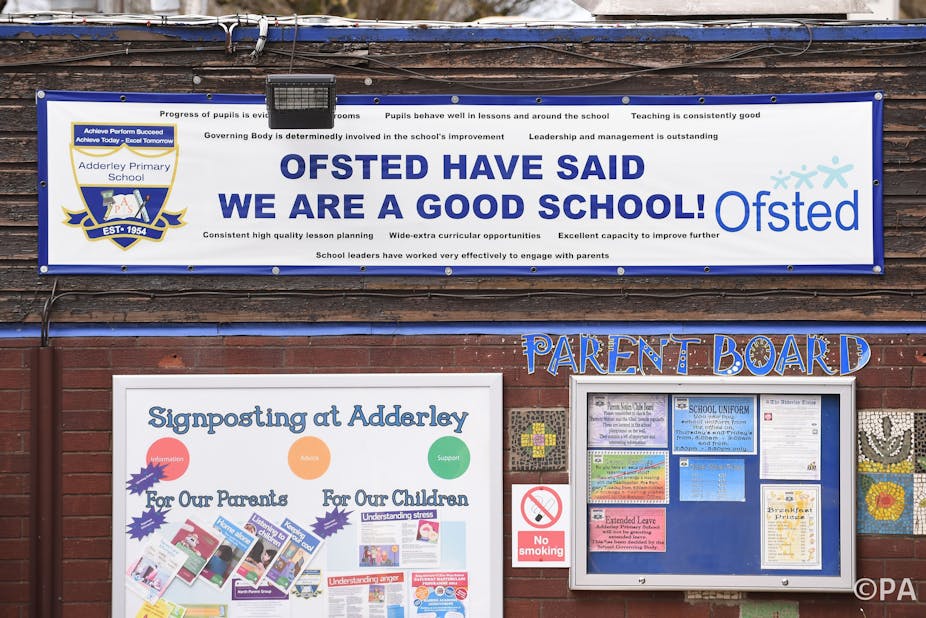The process of reform in any complex organisation is difficult, uneven and subject to being blown off course by events. In two recent articles in the Conversation I have drawn attention to the cultural shift apparently underway in Ofsted, the English schools inspectorate.
That shift towards a “new” Ofsted, more responsive to the complexities of the inspection process and to the concerns of its critics, has received a set-back – hopefully temporarily. This is due to the publication of a letter by its chief inspector Michael Wilshaw to the secretary of state for education, Michael Gove, in the light of the “Trojan Horse” investigation into extremism being taught at Birmingham schools. The letter reveals something of the “old” Ofsted mind-set which has proved so damaging to the inspection process in the past.
In it, the chief inspector castigates almost all parties involved in the Trojan Horse schools but especially some governing bodies, the local education authority, the Education Funding Agency, and, indirectly, the department for education. Of the official bodies involved with Birmingham schools only Ofsted itself escapes from Ofsted criticism.
Flawed inspection framework
I am not concerned here to critique the actual findings of the Ofsted inquiry: I have no inside knowledge which would lead me to support or reject their recommendations, which have led five schools to be placed under special measures. I do, however, have considerable reservations about Ofsted’s unwillingness to acknowledge limitations in its own procedures and processes, which have contributed to the current crisis. I’ll focus on three of these here.
Like most schools currently subject to periodic Ofsted inspection, most of the schools at the heart of the inquiry have been inspected recently under section 5 of the Education Act 2005. But as many of us have argued, the section 5 inspection framework is flawed and fails to do justice to the full life and work of the schools. It employs a very impoverished view of what constitutes “effectiveness” and “achievement” and is focused unduly and disproportionately on performance data in tested or examined subjects.
Many other aspects of a school’s life and work get short shrift. Schools judged as “outstanding” or “good” under these restricted, results-oriented criteria may have serious shortcomings which will not be given the prominence they deserve in this myopic view of what makes an effective school.
This, I suspect, lies behind the sudden and, to many observers, inexplicable decline reported in some of the Birmingham schools such as Park View School, downgraded from “outstanding” to “inadequate” on the basis of more focused inspections which belatedly take account of far more than performance data.
The current inspection framework has four focus points: pupils’ achievement, teaching quality, leadership and management, and pupils’ behaviour and safety. All but the latter are pegged on achievement measured in terms of performance data.
Conspicuous by its absence as an explicit focus is the quality of the school’s curriculum, its main medium for the transmission of knowledge, understanding and values. Yet it is these issues that are at the heart of the current Trojan Horse controversy. In his letter, the chief inspector does not acknowledge the curriculum lacuna in the very heart of its normal processes of school inspection. He should have acknowledged that deficiency but did not.
Categories outdated
A second lesson Ofsted should draw is the inadequacy of its fourfold categorisation of schools as “outstanding”, “good”, “requires improvement” and “inadequate”. To reduce the complexity of a single school to a single descriptor is bad enough. To reduce the richness and complexity of a whole system to a percentage distribution over just four categories is gross oversimplification.
Every school is a complex amalgam of strengths and weaknesses and it is these that need to be communicated to those who need to know. Single descriptors get in the way of sophisticated professional analyses and detract from forensic examination of what is working well and not so well in relation to any school’s declared aims and values.
Just as Ofsted has moved away from making lesson grades, so it should move away from offering crude overall grades in its school inspection reports. What is needed instead are reports which provide an independent professional evaluation of the values, aspirations, achievements and shortcomings of particular schools in a readable, bespoke way. These can then be used as a basis for dialogue with parties interested in the educational well-being of their learners. Forcing crude overall gradings on schools stifles rather than stimulates that sophisticated dialogue.
Catching schools out
A third lesson, unlikely to be heeded in the heat of the controversy, is to avoid the knee-jerk reaction of imposing no-notice inspections as a matter of course in all circumstances. The positive cultural shift to which I have alluded previously involves a number of changes, not just in impression management.
This includes Ofsted now avoiding implications that schools are out to thwart the inspection process and that some at least need to be “caught out”. Unfortunately that impression is in danger of being revived if no-notice inspections become the rule, not the exception.
I hope that the chief inspector will learn lessons from the Trojan Horse inquiry, including acknowledgement of Ofsted’s own limitations. He should not allow aspects of the “old” Ofsted mind-set to derail the much needed rehabilitation of school inspection in England.

